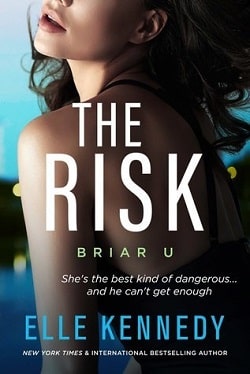"More honest than pretending to be noble about it. The people who come to the track aren't victims. They're adults making adult choices. I just handle the paperwork." There's steel in her voice when she says this, a hardness that doesn't match her quiet demeanor. She's defending her world, which means she knows it's shameful work—taking money from gambling addicts and men who drink too much. So she has a conscience...
"What about before the track?" I ask. "University?"
Her fingers find the rim of her vodka glass, rotating it slowly on the scarred wood table. "Accounting. Two years before I dropped out."
"Why?"
"Family obligations."
The pause that follows tells me everything. Family obligations in her world means her brother got into trouble and she paid the price. It's a story I've heard a dozen times, but hearing it from her makes it feel fresh.
"Regrets?" I ask.
"About dropping out?" She shrugs. "Numbers are numbers. I use the same skills now that I would have used in some corporate office. The only differences are the hours and the clientele."
"And the money."
"The money's better at the track." She finishes her vodka and sets the glass down with finality. "What about you? Always been in the family business?"
The question is careful, neutral. She's fishing, but she's good at it. I could deflect, keep the focus on her, but giving her small pieces of truth will make her trust me faster.
"Since I was old enough to hold a gun properly," I say. "My father believed in early education."
"That must have been a childhood." She scoffs and rolls her eyes, stealing a glance at the bartender as if she wants another drink. I raise my finger, and he nods at me before I answer.
"It was a childhood. Not necessarily a good one, but it prepared me for what came after. You learn quickly when the alternative is disappointing people you can't afford to disappoint."
She nods, and I see recognition in her eyes. She understands that kind of pressure, that weight of family expectations. It's another connection, another thread I can pull.
"Do you ever think about leaving?" she asks when the fresh drinks arrive.
"Moscow?" I lift one eyebrow, not sure I understand her or her question.
"The life."
The question surprises me with its directness. Most people dance around the subject of the Bratva, afraid to acknowledge what everyone knows. But Zoya asks it plainly, without apology.
"No," I answer honestly. "This is what I am. Where would I go?"
"Anywhere. You could be anyone."
"Could you?"
She goes quiet, considering. When she speaks again, her voice is softer. "Sometimes, I think about it. Getting on a train and going somewhere nobody knows my name. Starting over."
"What stops you?"
"Same thing that stops you, I think. This is what I am too."
The admission is more intimate than anything we've shared so far, probably more intimate than I expected this evening. It's like she's putty in my hand. She's letting me see something real,something vulnerable. Either she's very good at this game or the vodka is working faster than expected.
I lean forward, closing the distance between us across the small table. "Maybe we're both exactly where we're supposed to be."
Her eyes find mine and hold. The air grows thicker, charged with chemistry more tangible than the night I followed her to her house. When I reach across the table and touch her hand, she doesn't pull away.
"Maybe we are," she says quietly.
We stay until the bar starts emptying out, the conversation flowing easier as the night progresses. She tells me about her favorite books—Russian classics, mostly, heavy stories about suffering and redemption. I tell her about the places I've traveled for work, editing out the violence but keeping the details that make her eyes light up.















